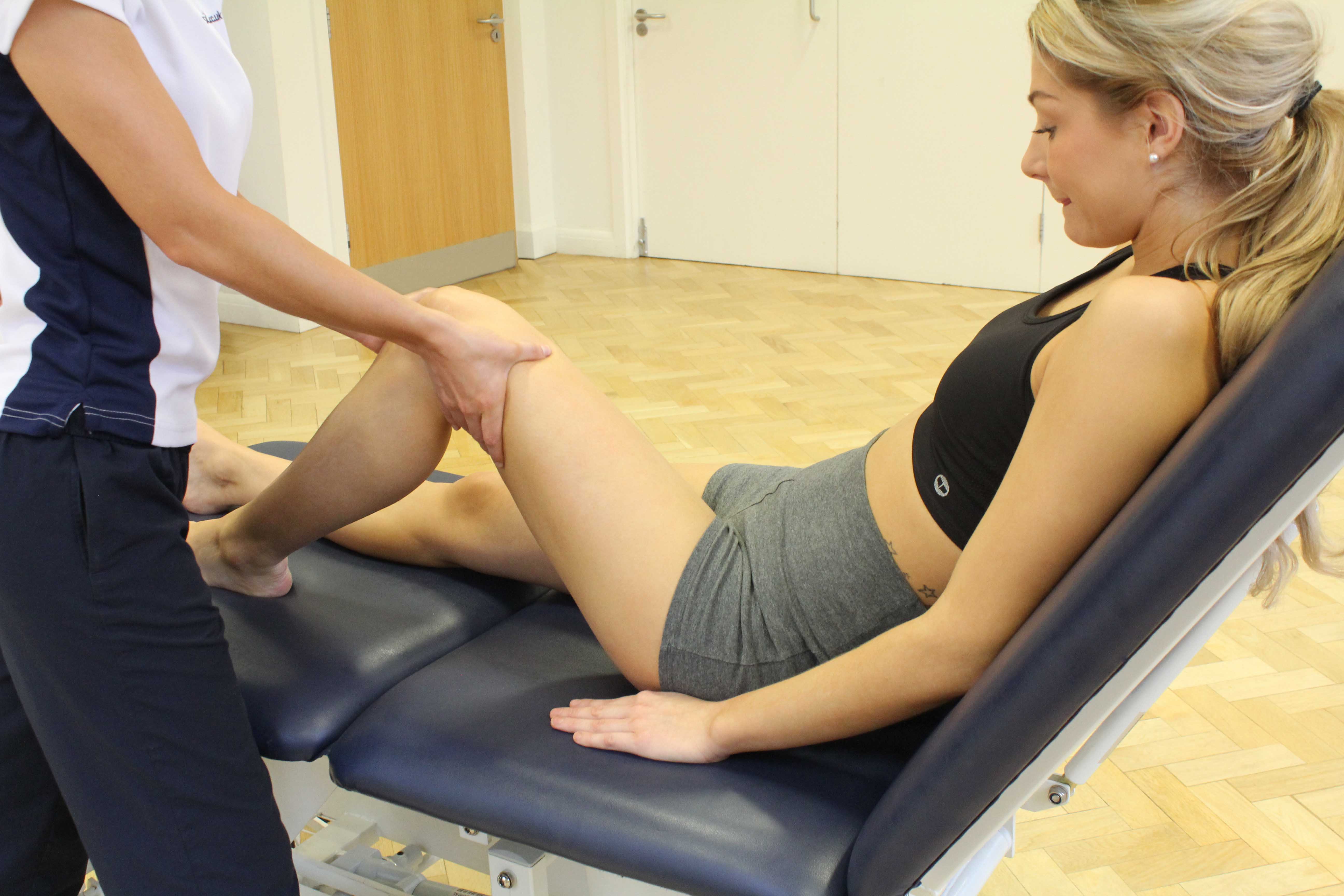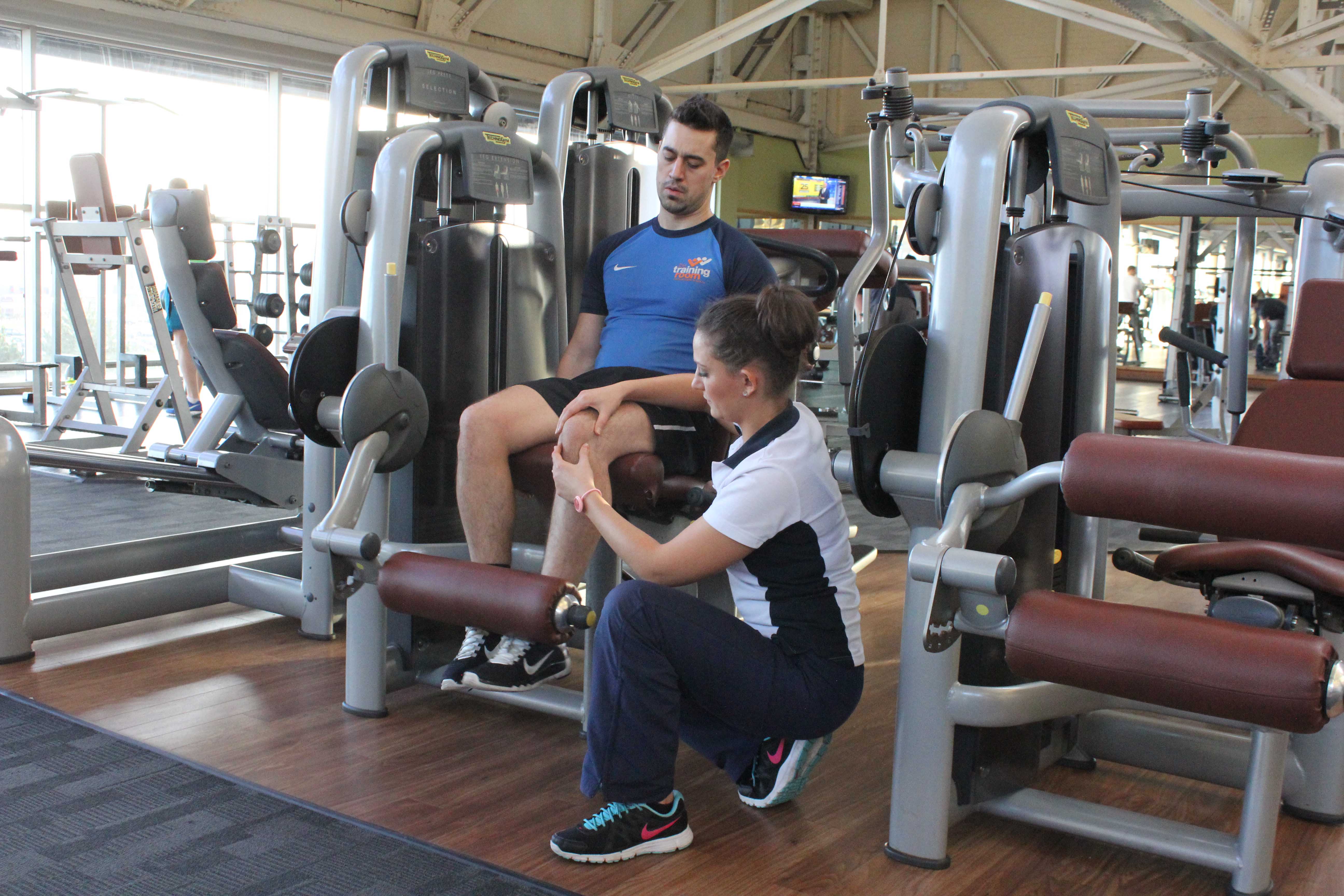What is an anterior cruciate ligament injury?
The anterior cruciate ligament or ‘ACL’ is a ligament inside the knee joint that provides stability to the knee. An anterior cruciate ligament injury occurs if this ligament is a torn. Physiotherapy is an essential treatment following an ACL injury.
How does an anterior cruciate ligament injury happen?
The most common mechanism of injuring the ACL is a twisting movement with the foot planted on the ground. The ACL can also be injured by a direct blow to the knee or if the knee is bent the wrong way.
 Above: Therapist performing soft tissue massage on the tissues aound the knee
Above: Therapist performing soft tissue massage on the tissues aound the kneeWhat are the symptoms of an anterior cruciate ligament injury?
When the ACL is completely torn there is often an audible ‘popping’ noise and feeling of something within the knee joint moving out of and then back into place. Pain is usually experienced for the first few minutes after the injury and often subsides quickly. The injured knee may collapse if you attempt to run or perform a twisting movement whilst standing. Significant swelling normally occurs within the first couple of hours.
Other symptoms include:
What should I do if I have an anterior cruciate ligament injury?
If you have injured your ACL you should stop your activity immediately. To control the amount of swelling, the RICE regime should be followed (Rest, Ice, Compression, Elevation).
Physiotherapy for an anterior cruciate ligament injury.
Patients who think they have an ACL tear should arrange an assessment as soon as possible. Specific tests can be performed to determine if you have injured your ACL. It can, however, be difficult to diagnose ACL injuries immediately after an injury as pain, swelling and muscle spasm can limit the assessment. You may be referred for an MRI scan of your knee or to an orthopaedic surgeon if it is deemed appropriate.
Whether surgery is performed following an ACL tear depends on several factors. The factors include; age, occupation, previous level of activity, stability of the knee, and willingness and ability to comply with the post operative rehabilitation. Physiotherapy is crucial following an ACL tear, whether reconstructive surgery is performed or not. If surgery is performed, the success of the surgery rests largely on the dedication of the patient to the rigorous programme of physiotherapy.
 Above: Progressive knee strengthening exercises performed under supervision of experienced MSK physiotherapist
Above: Progressive knee strengthening exercises performed under supervision of experienced MSK physiotherapistPhysiotherapy treatment if surgery is to be performed following an anterior cruciate ligament injury.
Physiotherapy should commence immediately after you tear your ACL. The initial focus is on reducing swelling and restoring full range of movement. Many orthopaedic surgeons refuse to operate on patients until they have a full range of movement in the injured knee. To accelerate your recovery once you have had surgery, an exercise programme will be written for you to strengthen the muscles of your injured leg as much as possible before the surgery is performed. This is known as prehabilitation.
The first few weeks after the surgery are focussed on reducing swelling, pain, increasing range of movement and maintaining as much muscle strength as possible. Many orthopaedic surgeons have preferred protocols for post operative exercises, knee bracing and weight bearing status (the use of crutches). Physio.co.uk will liaise with your surgeon throughout your rehabilitation.
The normal timeframe for rehabilitation back to contact sports following an ACL reconstruction is approximately nine months after the date of the surgery. The amount of time it takes to rehabilitate an individual back to ‘normal activity’ largely depends on the individual themselves, their motivation and the level of activity that they wish to achieve. The amount of time before you can return to work varies according to the demands of your job.
Your physiotherapist and orthopaedic surgeon will be able to advise you on how soon after the operation you can expect to return to work. An individual may return to contact sports when the pain and swelling have subsided, the knee has full range of movement, the strength and endurance of the muscles have returned to normal and balance and neuromuscular control have been regained. The timeframe for recovery is, however, continually being reduced with advances in surgery and the use of accelerated rehabilitation programmes.
Treatment may include:
Physiotherapy treatment if the knee is to be managed conservatively following an anterior cruciate ligament injury.
Physiotherapy should commence immediately after you tear your ACL. The aim of rehabilitation is to allow you to return to normal activity, whether that be work or sport, as soon as possible, and reduce the chances of you damaging your knee further when you do return. As with individuals who are to have reconstructive surgery, the initial focus is on reducing swelling and restoring full range of movement. Once the range of movement is restored and pain and swelling have been reduced then the focus is on strengthening the muscle groups around the knee and improving balance and control.
What shouldn’t I do if I have an anterior cruciate ligament injury?
If you have or suspect you have injured your ACL, you shouldn’t continue to participate in sports. Your knee may give way or collapse, injuring other structures. You also should avoid activities such as, hot showers, heat rubs, the consumption of alcohol and excessive activity within the first 48 hours of your injury. This is because these activities increase blood flow to the injured knee, increasing bleeding and swelling around the injured ligament potentially prolonging recovery.
Could there be any long-term effects from an anterior cruciate ligament injury?
Unfortunately an injury to the ACL can impose a prolonged absence from sport, often over twelve months. Surgery is performed in many cases because the ACL is unable to heal itself and the knee is often very unstable without it. Following the surgery some individuals may experience ongoing problems with pain in or around the knee.
It is thought that if the ACL is not reconstructed then the amount of ‘wear and tear’ in the joint may be increased leading to arthritis in later life.
To arrange a physiotherapy assessment call Physio.co.uk on 0330 088 7800 or book online.

 0330 088 7800
0330 088 7800

































